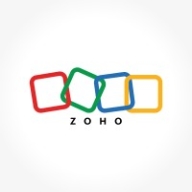

Salesforce Sales Cloud and Zoho CRM compete in the CRM category, with Salesforce having the upper hand in terms of customization and in-depth reporting, while Zoho stands out as more affordable and easier to use, particularly for small businesses.
Features: Salesforce Sales Cloud offers robust customization, allowing on-the-fly admin changes, and provides comprehensive reporting capabilities. It integrates well with various email platforms and supports a wide array of apps. Zoho CRM is known for its ease of use, affordability, and extensive API options. Its dashboards and reporting tools are effective, especially for smaller teams and startups.
Room for Improvement: Salesforce Sales Cloud could improve its interface simplicity and reduce the complexity of its automation processes, as users often face a steep learning curve requiring additional consulting. Zoho CRM could enhance its email template functionalities and improve social media integrations, along with providing more advanced automation tools and better mobile usability.
Ease of Deployment and Customer Service: Both Salesforce and Zoho primarily offer public cloud solutions. Salesforce's customer service varies by service agreement with a premium for higher support levels, whereas Zoho provides consistent support across packages. Users of Salesforce often use community forums, while Zoho maintains direct support methods.
Pricing and ROI: Salesforce Sales Cloud positions itself as a premium solution, with high licensing and implementation costs, but offers substantial ROI through its comprehensive features. Zoho CRM offers a budget-friendly alternative with competitive pricing and significant value for small to medium enterprises, appealing to startups with its cost-effectiveness and bundled applications.
Salesforce Sales Cloud is a fantastic tool but requires disciplined data entry by sales personnel and operations teams to maintain data quality.
We are not just implementing Salesforce Sales Cloud; we need to understand what the customer wants to achieve in 5 to 10 years.
I wouldn't say you go to Salesforce Sales Cloud for their customer support unless you purchase one of their premier plans, which is additional money.
Support requires a subscription and when taken, the service is pretty nice.
Sometimes, they don't understand what my actual needs are.
The 1.5 deduction from 10 is due to cultural communication differences based on where we're getting the support, as sometimes it takes a couple of times to communicate clearly enough for them to understand the issue.
There are multiple blogs and articles available online for self-help.
Salesforce is highly scalable and operates efficiently.
Salesforce Sales Cloud is totally cloud native, requiring no additional effort for scalability.
Salesforce Sales Cloud's scalability is impressive as it grows easily with my organization's needs.
The system is easy to understand, implement coding, and conduct training.
Zoho CRM is quite scalable; I have worked with clients who started with ten companies and have scaled up to managing 500 employees effectively within Zoho CRM.
The platform's global data centers across regions such as the US, EU, and India ensure data security and privacy through ISO certification and strong role-based security, which is essential for handling sensitive customer data.
Salesforce Sales Cloud is very stable.
I have not experienced any degradation in Salesforce's performance.
Zoho CRM guarantees 99% uptime, with downtime incidents being very rare.
I find Zoho CRM to be 100% stable and reliable as far as I know.
It is usually compliant with data regulation laws and is HIPAA compliant.
If you're looking at other tools out there, for example SalesLoft or HubSpot, it's much easier to build those workflows and do automation.
Compared to AWS, it is slower, which could be a hindrance.
With today's generative AI capabilities like ChatGPT, it should be possible to directly communicate with the software rather than navigating through the entire system manually.
The platform does not save code versions similar to GitHub, where you can compare new versions with previous ones.
Some organizations may prefer not to have their data on the internet since Zoho CRM runs as a cloud service.
The main improvement needed for Zoho CRM is introducing SQL code for reports, similar to what's in Zoho Analytics.
Without negotiation, costs can become expensive.
This happened for the first time because of the new CEO, Arundhati, who revolutionized pricing strategies, allowing discounts of 60-70% for Salesforce Sales Cloud in India.
Salesforce Sales Cloud is extremely expensive.
Zoho CRM and all of Zoho's software are quite affordable because they are specifically designed for small and medium businesses.
In terms of my experience with the price and licensing cost, as with setup cost for Zoho CRM, it might not be quite affordable because there are cheaper solutions available.
Its easy-to-navigate interface aids in delivering clear vision and organization, especially for sales and business management.
Being able to pull reports in Salesforce Sales Cloud based on any of the fields that we have there and then building logic on those fields saves me time and also gives me visibility into what's going on with my teams across multiple departments, which is very helpful for us.
The Einstein Analytics and the inbuilt reporting are very useful for keeping track of pipeline movement.
The most valuable aspect of CRMs, including Zoho CRM, Salesforce, and Microsoft Dynamics, is automation capabilities.
The most valuable feature I have found in Zoho CRM is custom functions. You can achieve anything with it. From integrations with other applications, it is instant.
You can customize everything—what you sell, be it products, services, or projects.
| Product | Market Share (%) |
|---|---|
| Salesforce Sales Cloud | 2.0% |
| Zoho CRM | 1.6% |
| Other | 96.4% |


| Company Size | Count |
|---|---|
| Small Business | 55 |
| Midsize Enterprise | 26 |
| Large Enterprise | 40 |
| Company Size | Count |
|---|---|
| Small Business | 44 |
| Midsize Enterprise | 6 |
| Large Enterprise | 10 |
Salesforce Sales Cloud is a comprehensive tool lauded for its customization, ease of use, and integration capabilities. Its cloud-based nature offers seamless access and scalability, helping manage leads, opportunities, and workflows efficiently. Powerful reporting and dashboards enhance visibility and productivity.
Salesforce Sales Cloud serves as an essential aid for companies aiming to streamline sales processes. It integrates sales and marketing, manages customer data, and supports automation, which increases efficiency. Despite its expense and complex interface, its ability to forecast, track customer engagement, and automate key workflows stands out. Companies encounter challenges with system costs and integration issues, particularly regarding third-party applications and mobile functionality. Reporting and dashboards offer significant insights, although room for improvement exists. Licensing costs and storage fees are considerations for prospects, alongside the need for improved training and AI features. Users maximize the platform for sales pipeline management, forecasting, and operational analytics.
What are the most important features?Organizations across industries utilize Salesforce Sales Cloud from finance to healthcare for business development and CRM tasks. It is integral to managing accounts, leading pipelines, and aligning sales with marketing strategies. Firms improve customer relations and operational efficiency through its analytics and reporting capabilities.
Zoho CRM empowers organizations with a complete customer relationship lifecycle management solution for managing organization-wide Sales, Marketing, Customer Support & Service and Inventory Management.
We monitor all CRM reviews to prevent fraudulent reviews and keep review quality high. We do not post reviews by company employees or direct competitors. We validate each review for authenticity via cross-reference with LinkedIn, and personal follow-up with the reviewer when necessary.